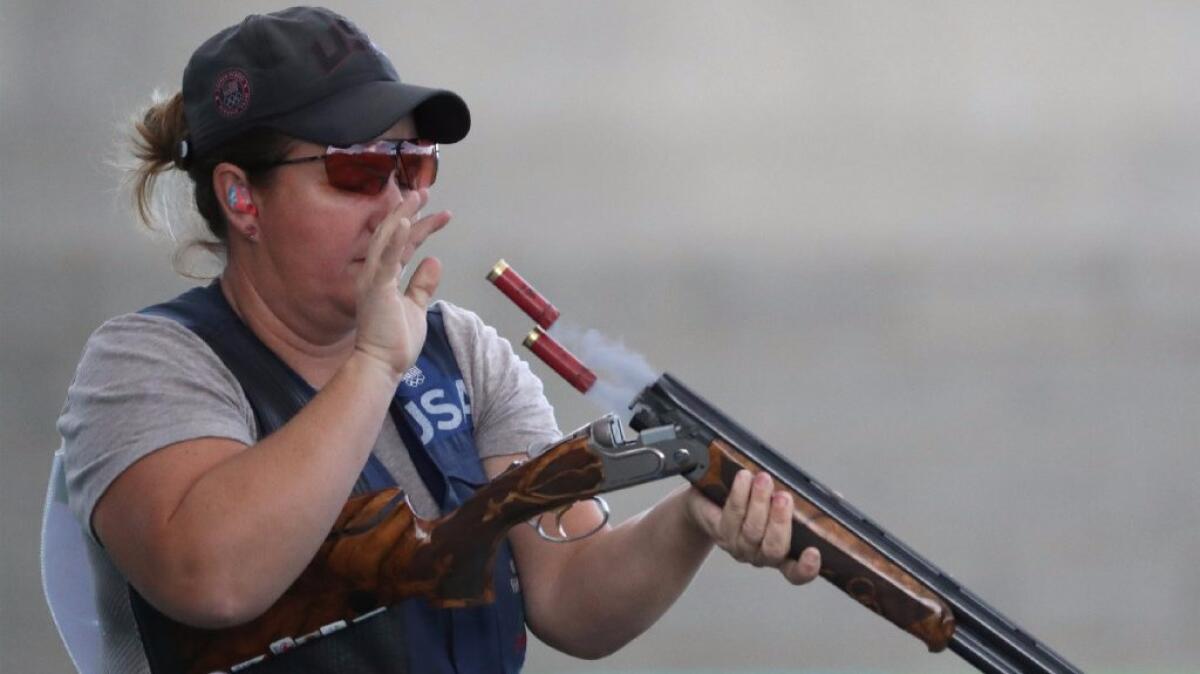L.A.’s most unsung Olympian continues to excel in her sixth Olympics

Reporting from Rio de Janeiro — It wasn’t the first time Kim Rhode had faced a do-or-die moment at the Olympics.
The skeet shooter stayed calm, even as she struggled with tricky lighting and a breeze that tugged at the bright orange targets as they sailed through the air. She kept her thoughts simple.
Just don’t miss.
Not until the 37-year-old Southern California native had survived a shoot-off to win bronze at the Rio de Janeiro Olympics — a historic sixth medal in six consecutive Summer Games — did she finally lose control.
Friends and family could not recall her ever showing so much emotion on the podium, her tears clearly visible from the stands.
This is a woman who has quietly built one of the greatest careers in Olympic history, amassing three golds, a silver and two bronzes over two decades of shouldering a shotgun in skeet and double trap. If Friday did not rank among her best performances, it might have been the most special.
An hour later, standing at the edge of the range, Rhode began to cry again.
“I’ve had a rough three years,” she said. “It’s been a challenge.”
::
Everything seemed to be going her way at the 2012 Summer Games.
Hitting 99 of 100 targets — an Olympic record — Rhode won the third gold of her career. In a sport that rarely garnered attention, she became a media favorite, always smiling and eager to talk.
Back home in Monrovia, doctors informed her that she had been pregnant at the time of the London competition. She and her husband, Mike Harryman, were thrilled.
Then complications set in.
The ensuing weeks became a blur of specialists and physical therapists, and a grinding in her pelvic bones that made walking painful. Rhode was bedridden for months before giving birth to her son, Carter, in the spring of 2013.
“After that, we started working, trying to get her back in shape,” said her father, Richard, who has always been her coach.
Only a few weeks later, Rhode was rushed to the hospital to have her gallbladder removed. At that point, shooting moved well down her list of priorities.
“I was so ill I didn’t even think about it,” she said. “I was just anxious to get better and raise my son.”
There were thoughts of retiring, but the Olympics ran too deep in her blood. From the time she won her first medal as a teenager, taking gold at the 1996 Atlanta Games, her life had unfolded in repeating four-year cycles, each chapter ending the same way.
I think it’s just standing up there on the podium, It’s addicting.
— Kim Rhode, skeet shooter

“I think it’s just standing up there on the podium,” she said. “It’s addicting.”
As the younger shooters on the U.S. team traveled the world, sharpening their skills, winning competitions she used to dominate, Rhode struggled to walk around the block. Back on the range, her strength returned slowly.
“I was rusty and I had to take tiny steps,” she said. “It was frustrating.”
By 2014, she needed to resume competing at international events to accumulate points toward making the American squad for Rio.
Showing up with little or no practice, she gritted her way through.
“Did it on guts alone,” her father said.
Everyone in the family pitched in: Mike quit his job to be a stay-at-home dad and Rhode’s mother, Sharon, took over scheduling and travel and making sure the bills got paid.
Rhode managed to medal in three World Cup events in 2014 and take gold at the Pan American Games the following year, even as she suffered a setback when she had a bad reaction to a bug bite in Cyprus.
Accustomed to years of burning through as many as 1,000 rounds a day in practice, she was making do with half that number because her arms were still weak. It wasn’t until February that doctors cleared her to resume full-time — if cautious — training.
In the past, she often had been one of the early qualifiers for the U.S. shooting team. This time, she had to wait until May to secure a spot in skeet behind 23-year-old Morgan Craft.
“Oh my gosh . . . she’s been doing this for longer than I’ve been alive,” Craft said, referring to Rhode’s career that started when she was young. “It’s extremely impressive.”
Arriving in Rio, Rhode knew she was not back to full capacity. It would take something extraordinary for her to make history.
::
The day began cloudy, with intermittent bursts of rain that drenched the Olympic shooting center in Deodoro, about 40 minutes northwest of central Rio de Janeiro.
Rhode finished second in qualifying despite the difficult conditions that included one spot where targets seemed to vanish against a backdrop of distant hills.
In the semifinals, the two Italians — Chiara Cainero and eventual winner Diana Bacosi — were too good. Rhode suffered a couple of uncharacteristic misses, winding up in the bronze-medal match.
That’s when the pressure kicked in, as she faced off against Wei Meng of China.
“Oh, most definitely . . . knowing you can get Olympic history or nothing,” she said.
The contest remained close though four stations, with each woman missing only once. They continued through four shoot-off rounds of two shots each before Wei finally wavered.
Lifting her arms skyward, turning toward the stands, Rhode spotted her family and, in particular, her son calling out “Mommy.” Tears came to her eyes.
The only other Olympian to go six for six was Armin Zoggeler, an Italian luger who put together his streak in the Winter Games. Rhode talked about matching the record, saying it had been on her mind all day.
Given what she had been through, this bronze felt as satisfying as any of the golds she had won in the past.
“When I started with the Olympics I was 16,” she said. “Now I’m 37. I’m a mom. Who would have thought?”
Follow David Wharton on Twitter @LATimesWharton
More to Read
Go beyond the scoreboard
Get the latest on L.A.'s teams in the daily Sports Report newsletter.
You may occasionally receive promotional content from the Los Angeles Times.







